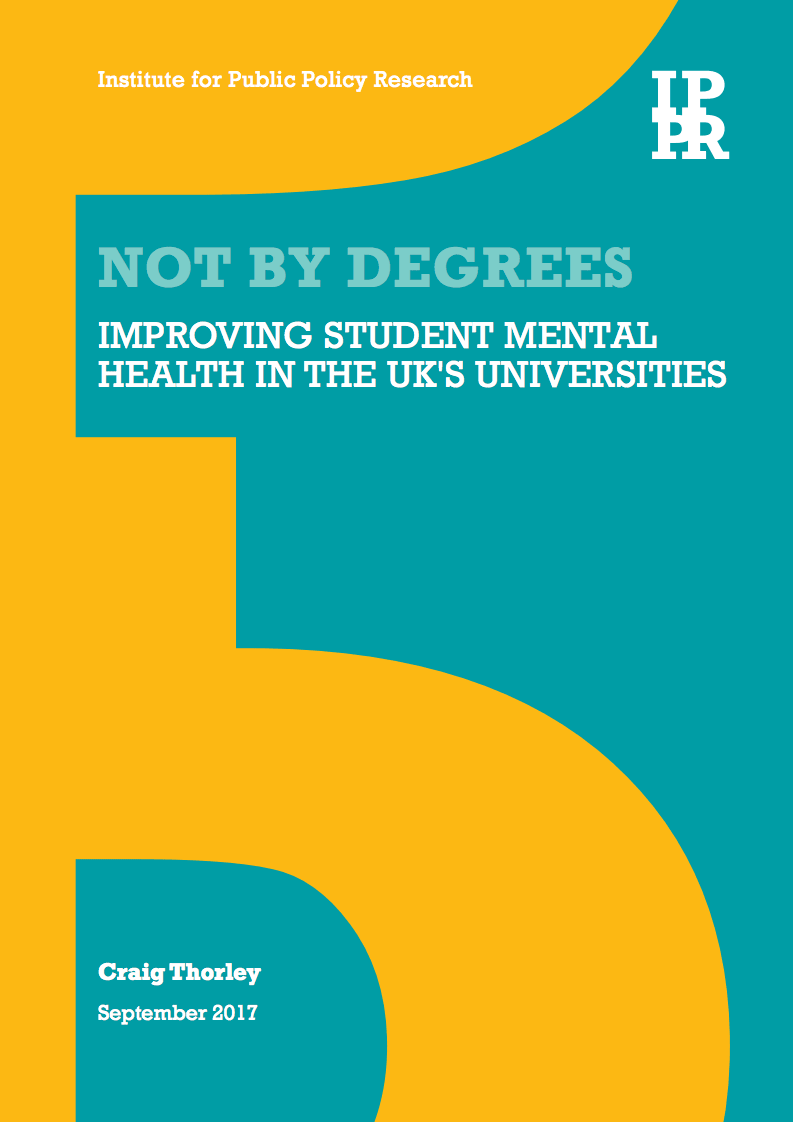Read Full Report by the Institute for Public Policy Research
Not by degrees: Improving student mental health in the UK’s universities
Not by degrees: Improving student mental health in the UK’s universities is a report by the Institute for Public Policy Research. This report is an interesting insight into the state of postsecondary student mental health in the UK. The report explores levels of mental illness, mental distress and low wellbeing among the wider population of young adults in the UK – who make up the majority of the student population – and how they have changed over time , before turning to consider the same questions in respect of students, in particular. It then sets out the factors which are likely to have driven changes to prevalence rates and demand for mental health services among students and the extent to which these are associated with the student experience. The report then turns to consider the strategies that universities are implementing in order to meet the challenge. It explores how services are configured across the sector and how far levels of demand, before focusing on the two key elements of a ‘whole-university approach’ to mental health and wellbeing – prevention and promotion and access to support, care and treatment. The final chapter of the report sets out a number of recommendations – targeted at universities, government and the NHS – for improving the mental health and wellbeing of students, and ensuring that all those who require support, care or treatment are able to access it.
Levels of mental illness, mental distress and low wellbeing among students in higher education in the UK are increasing, and are high relative to other sections of the population. Around three-quarters of adults with a mental illness first experience symptoms before the age of 25. As the student population comes to more closely reflect the UK’s wider socioeconomic and demographic make-up, a growing proportion of students are affected by mental illness. Over the past 10 years there has been a fivefold increase in the proportion of students who disclose a mental health condition to their university. Students can be at added risk of experiencing poorer mental health and wellbeing, due to factors relating to academic, financial and social pressures. This is evident in the high levels of mental distress reported by students, and the extent to which universities have experienced dramatic increases in the number of students seeking counselling support.
Key Findings
Today’s generation of young adults – and particularly young women – are more likely to experience mental illness than previous generations.
In England, 19 per cent of 16–24-year-olds experience a mental health condition, up from 15 per cent in 2003. Among this age group, 28 per cent of women experience mental health problems, compared to 10 per cent of men. This difference between the sexes is also evident in Scotland, Wales and Northern Ireland. The number of students who disclose a mental health condition to their university has increased dramatically in the past 10 years.
In 2015/16, 15,395 UK-domiciled first-year students disclosed a mental health condition – almost five times the number in 2006/07. This equates to 2 per cent of first-year students in 2015/16, up from 0.4 per cent in 2006/07.
Mental health conditions account for an increasing proportion of all disability disclosed by first-year students (17 per cent in 2015/16, compared to 5 per cent in 2006/07).
Female first-year students are more likely than male firstyear students to disclose a mental health condition (2.5 per cent compared to 1.4 per cent) (2015/16). In 2009/10, male and female students were equally likely to disclose a mental health condition (both 0.5 per cent).
Recommendations
Poor mental health and wellbeing can affect students’ academic performance and desire to remain in higher education (HE). In the most severe and tragic circumstances, it can contribute to death by suicide – levels of which have also increased among students in recent years. The HE sector and government both have an interest in helping to improve the mental health and wellbeing of students. Universities should make the issue a strategic priority, as there is currently too much variation in how well equipped universities are to meet this challenge.
- The HE sector should collectively adopt student mental health and wellbeing as a priority issue, with individual institutions developing their own ‘wholeuniversity’ approaches subject to audit and quality assurance, and underpinned by common principles which draw on best practice.
- HEIs should increase the funding dedicated to services which promote and support the mental health and wellbeing of students, in line with an open and robust analysis of current student need and reasonable future projections.
- Government should facilitate new placebased coalitions to improve student’s health through greater integration across local services. Including the introduction of a new Student Health Fund into which local health and education partnerships can bid, and new pilots of 0–25 mental health services in places with high student populations.
- Government should introduce a new Student Premium to top-up the funding of GP practices with high proportions of student-patients, given that students have been recognised by NHS England as an ‘atypical’ population likely to lose out from current funding arrangements.
- Government should pilot a new digital Student Health Passport, to improve the continuity of healthcare and treatment among students who move between home and university, and ensure that they have control over their own health data.
The full version of the Not by degrees is available here.
Additional Information
Browse Literature Highlights
August 8, 2017
Shared Perspectives
March 26, 2018


